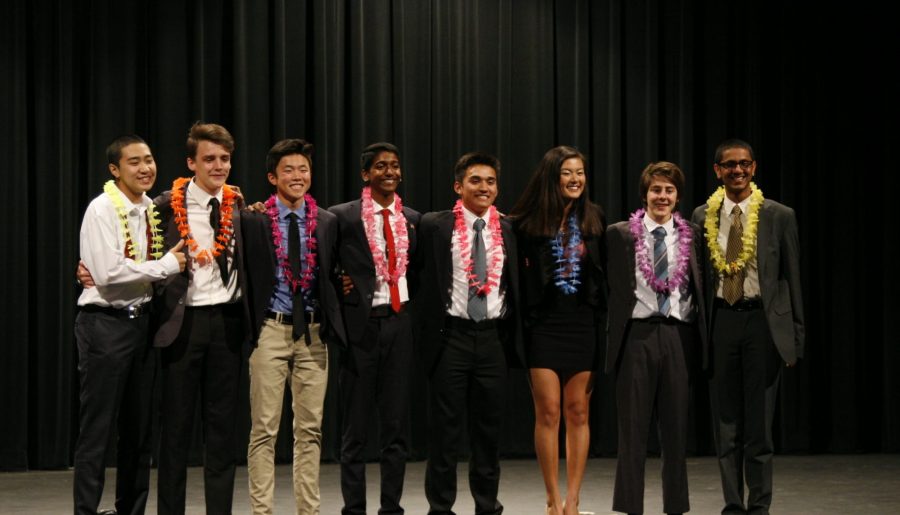
By ARNI DAROY
Executive Editor
Note from the writer: The identities of all of those interviewed are kept anonymous. Regarding controversial topics, such as sexism, people’s opinions may be devalued because of their identity. All of those quoted and interviewed will only be referenced by their gender and position sought. In addition, all of those interviewed are referenced as former candidates, whether they won their election or not. The terms gender and sex are used throughout the article and are two different terms. Sex is dependent on biology while gender is dependent on social constructs. The term gender is used to address sexism because sexism is dependent on the constructs of gender.
Sexism is present in the most democratic process at University High School: Election Convention.
This issue is complex and multi-faceted, and while an article cannot address all of the facets or implications concerning the issue, it is important to discuss it. The biggest problem in dealing with sexism is that – for the most part – it is subconscious.
Sexism is defined by the Oxford Dictionary as “the prejudice, stereotyping or discrimination, typically against women, on the basis of sex at a systemic level.”
Looking at each of the elections in Election Convention individually, it is hard to argue that sexism has been an influence mainly because there is no way to pinpoint the exact reasons one person loses, especially when the reasons may be subconscious. Looking at all of the elections in Election Convention as a whole, however, reveals a common trend: females tend to lose to their male opponents in startling numbers.
This year marks the 25th annual Election Convention – the election of the ASB officers for the 2016-2017 school year. While Election Convention began in 1992 with the election of the 1992-1993 ASB, the evidence available for this article goes as far back as the election of the 2004-2005 ASB (with the exception of 2005-2006 and 2007-2008 ASB officers as the positions were unavailable at the time this article was written).
In the eleven years of data, there have been two female Presidents and nine male Presidents, four female Vice Presidents and seven male Vice Presidents, two female Student Representatives (one girl served two terms) and eight male Student Representatives, five female Spirit and Rally Commissioners and six male Spirit and Rally Commissioners, eight female Clubs Commissioners and four male Clubs Commissioners and twelve male Student Activities Coordinators (SAC).
The data includes twelve male SACs and a total of twelve Clubs Commissioners because in the 2006-2007 ASB, there were two male SACs and two Clubs Commissioners (one male and one female). The positions of Girls Sports Commissioner and Boys Sports Commissioner are omitted from the data as the positions are gender-specific and therefore cannot provide substantial data on the trend of females losing to their male counterparts.
Looking at the breakdown of the positions as a whole shows a systemic bias towards males in the elected positions.
Using the aforementioned data, females make up 18.2% of Presidents, 36.4% of Vice Presidents, 27.3% of Student Representatives, and 0% of Student Activities Coordinators. Females make up 45.5% of Spirit & Rally Commissioners, and the only category in which females lead the percentage is in Clubs Commissioners with 66.7%. It is also worth noting that often females candidates elected in positions like Clubs Commissioner were not running against male candidates.
The argument may be then that male leaders are just more competent than their female counterparts. This notion is false, however, as females have consistently represented about about half of the entire ASB. To use the 2015-2016 ASB as an example, females make up 47.8% of ASB and 52.6% of the appointed ASB members. These numbers show a clear disparity.
Appointed positions are given based on interviews with a panel consisting of three or more current ASB members, the two ASB advisors and the newly elected President and Vice President. The panel chooses ASB members for these positions based on their qualifications and ideas. If females are able to prove themselves as leaders in the appointed interviews, proving them to be just as competent as their male counterparts, why is there a disparity with the number of females elected?
Part of the problem is with the number of females running for positions. Even in earlier years when more female candidates ran for elected positions, there were still fewer female candidates total when compared to male candidates. In the Election Convention for the 2012-2013 ASB, there were eleven female candidates to 18 male candidates. This year, only four female candidates ran for an elected position as compared to twelve male candidates. Looking at the numbers, there is a trend of decreasing number of female candidates each year.
To many, these numbers suggest that females are simply uninterested in the elected ASB positions, as fewer females run for these positions as compared to males. To some former candidates, however, these numbers tell a different story. When shown the data, a former female Presidential candidate said, “I expected that. Ask any girl who’s run for an ASB position, it’s tough even deciding to run. I felt qualified enough to run for President as I had been on ASB for two years prior, yet when I brought it up to a couple friends, I distinctly remember one of them telling me to, ‘Run for a position you can actually win.’”
The aforementioned former male Presidential candidate agreed, saying, “At the actual Election Convention, I realized I was expected by the people to win. I was the male candidate, and I needed to win.”
A former female Clubs Commissioner candidate related to the other female candidate’s experience, but in a different way. She said, “A friend of mine had told me that I was very straightforward and it came off maliciously, as a woman, and that that would inevitably deter men from voting for me. I felt like, if a man had held the same qualities and was running for Clubs Commissioner, he would receive praise for enforcing strict rules in working that position.”
A former female Vice Presidential candidate recalled a different form of discouragement from running; she said, “While, I don’t remember experiencing any gender-related discouragement during my campaign, I was definitely aware of the fact that I had only ever seen men serve in the position of Vice President during my time at Uni.”
A former female SAC candidate resonated, saying that, while no one openly said anything with regard to gender to discourage or encourage her, “what I did feel was a kind of internal discouragement. I wasn’t naive; I knew that my chances of being elected were slim. Before the convention, I didn’t know all of my opponent’s qualifications, but I did know his gender, and I knew that that would be the first thing people saw and considered when voting.”
These experiences brings up another problem with sexism in Election Convention: there seems to be a different standard for females running for elected positions.
A former female SAC candidate believes that while sexism did not play a role in her not getting elected specifically, she stated that there is a “common belief that women are not as funny as men, and that may very well have influenced voters’ opinions of me. Now it’s important to note that my position was mostly associated with being a face of entertainment…[so] I wasn’t held to the same standards as the other women on stage probably were, like expectations of not sounding ‘angry’ or ‘bossy’ or ‘too aggressive,’ but rather, I was probably seen as less entertaining because of the belief that women are generally not as funny as men.”
A former female Vice Presidential candidate agreed: “I remember being distinctly aware of the fact that I was the only woman running for my position, and as the only woman running against confident, smart, well-dressed men, I felt that I had to abandon my naturally calm disposition in favor of speech with strong conviction in order to be taken seriously as a candidate.”
A former female Clubs Commissioner candidate also brought up the different standards for females in terms of their attractiveness; she said, “because I ran against another female opponent, I felt as if we were held to different standards standing next to each other. I was told by several lowerclassmen that they voted for me because they thought I was physically attractive. I was offended that I was judged based on my looks rather than on my dedication to my cause.”
A former female Student Representative candidate adds that there is a different standard for females regarding their attire, saying “I couldn’t wear anything too scandalous, too prude or too unique. Having gone to another Election Convention as a candidate, I heard people talking afterwards about what I wore and how I should have ‘toned it down.’ Then they said that me being tall was ‘intimidating and unfeminine.’ Of course, some of these [comments] weren’t said to my face, but they still hurt. The second time around, I was much more careful. I even asked all the female candidates what they were wearing so I wouldn’t stand out as much. I feel like, as women, we become much more self-conscious about our appearance in front of larger groups of people because we are so heavily judged on our appearance.”
Despite inherent and unconscious sexism, Election Convention is still a fairer election process compared to those at other schools. Election Convention highlights the ideas of the ASB leaders during rounds of questions as opposed to a short speech then mass voting as most schools do for elections.
How then can Election Convention be improved to eliminate any sexist bias? Is there any way? The former candidates interviewed each presented a variety of solutions.
A former male Student Representative candidate said, “I’m not sure how we can improve or eliminate sexist bias, but encouraging students to examine past experience, accomplishments and qualifications should be made a priority so voters are educated on the candidates.”
A former male Presidential candidate said, “People won’t be comfortable with females in leadership roles until they are in those roles and are doing a great job. Election Convention itself would be hard to make more fair, unless we could revamp the process in which delegates are chosen.”
A former female Vice Presidential candidate proposed that the sexist bias in Election Convention “could be addressed by making sure the delegate pool is an even cross-section of male and female members of the student body.
Maybe even guidelines could be created for the way people answer the questions and people could get penalized for irrelevance because somehow the culture of the debate needs to switch to value the content of the answers more than the way in which they are spoken.”
A former female SAC candidate said, “The sexism that occurs is deeply ingrained in us because of how we learn to view people of different genders. It is not something Election Convention can control for nor change. It is something that we as an aware and open-minded society need to actively work to change.”
A former female Clubs Commissioner candidate agreed, saying, “Eliminating sexist bias would have to begin at a societal level. While improvements could be made to inform voters and candidates that their choices should be heavily based on qualifications and ideas over gender, it is inevitable that sexism will continue, especially amongst high school students.”
At the end of the day whether something can or cannot be done to fix the subconscious sexism in Election Convention, it is more important that it is being addressed and discussed.
Many of the candidates interviewed agree that sexism is a societal issue, not an individual issue, so conversations about sexism are extremely important because fixing a society issue starts with awareness.














